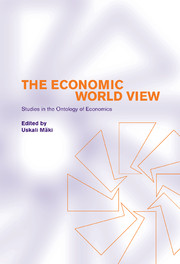Book contents
- Frontmatter
- Contents
- Notes on the contributors
- Preface
- I The what, why, and how of economic ontology
- II Rationality and homo economicus
- Part III Micro, macro, and markets
- 9 Essences and markets
- 10 The metaphysics of microeconomics
- 11 Ontological commitments of evolutionary economics
- 12 Is macroeconomics for real?
- 13 The possibility of economic objectivity
- Part IV The world of economic causes
- Part V Methodological implications of economic ontology
- Name index
- Subject index
10 - The metaphysics of microeconomics
Published online by Cambridge University Press: 04 August 2010
- Frontmatter
- Contents
- Notes on the contributors
- Preface
- I The what, why, and how of economic ontology
- II Rationality and homo economicus
- Part III Micro, macro, and markets
- 9 Essences and markets
- 10 The metaphysics of microeconomics
- 11 Ontological commitments of evolutionary economics
- 12 Is macroeconomics for real?
- 13 The possibility of economic objectivity
- Part IV The world of economic causes
- Part V Methodological implications of economic ontology
- Name index
- Subject index
Summary
The study of economics has been a going concern among philosophers for the better part of twenty years without very many people even noticing that economics has a metaphysics. Indeed, among economists the term “metaphysical” is probably an epithet of opprobrium, employed to suggest that a claim is untestable or otherwise without cognitive signifcance. Philosophers of economics will admit to the existence of an epistemology of economics – the study of the nature, extent, and justifcation of economic knowledge. But even this is controversial among some economists. The notion that economics might have a metaphysics as well as an epistemology will be scoffed at by those economists doubtful about the enterprise of the philosophy of economics altogether. Nevertheless, philosophers of economics should have no trouble identifying a metaphysics in some of the theoretical commitments of economics.
Or at least philosophers who have adopted a Quinean view of metaphysics as continuous with physics – and science generally, will have no trouble fnding metaphysical compartments of economic theory. To see why, recall the Quinean teaching that there is no well-founded distinction between necessarily true propositions, true in virtue of meaning alone – analytic truths, and contingent statements, true in virtue of content – synthetic truths. Nor do scientifc claims meet experience for tests one at a time; rather they meet experience in units no smaller than entire theories. Accordingly, the difference between sets of metaphysical statements and sets of empirical ones cannot be a matter of kind, say testable versus non-testable, or necessary versus contingent; instead the difference is at most one of degree.
- Type
- Chapter
- Information
- The Economic World ViewStudies in the Ontology of Economics, pp. 174 - 188Publisher: Cambridge University PressPrint publication year: 2001
- 1
- Cited by



